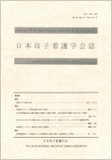Japanese
English
- 有料閲覧
- Abstract 文献概要
- 参考文献 Reference
目的
本研究は、出産後に母児同室を開始した母親の睡眠に影響する要因を明らかにし、高年初産婦の睡眠に焦点をあてて検討することを目的としている。
対象と方法
2012年6月から12月に東京都内の産科医療施設で経腟分娩後に母児同室を行った母親を対象に、母児同室開始時から産後3日目までアクティグラフで睡眠状態を測定し、母親の睡眠に影響を及ぼす要因との関連を検討した。本研究は、東邦大学看護学部および調査施設の倫理審査委員会にて承認を得て実施した。
結果
分析対象者は53名で、初産婦37名、経産婦16名であった。初産婦の総睡眠時間は母児同室1日目214.0分、2日目252.5分で、経産婦より短く有意差が認められた。初産婦の高年出産群と35歳未満群の比較では、35歳未満群が母児同室2日目に総睡眠時間が43分増加したのに対し、高年出産群では経時的な変化はみられなかった。初産婦の不妊治療後妊娠群と自然妊娠群の比較では、母児同室2日目の総睡眠時間は、不妊治療後妊娠群が自然妊娠群より短く有意差が認められた。初産婦では、「年齢」と「母児同室2日目の総睡眠時間」との間に負の相関が認められた。分娩時出血量が500ml以上群は、500ml未満群より総睡眠時間が短く、有意差が認められた。
結論
初産婦は、母児同室1日目および2日目ともに経産婦より総睡眠時間が短く、有意差が認められた。初産婦の高年出産群および不妊治療後妊娠群は、母児同室1日目と2日目の総睡眠時間の変化がみられず、「年齢」と「母児同室2日目の総睡眠時間」との間に負の相関があることから、高年出産群および不妊治療後妊娠群は、産後の睡眠時間が短い状態が持続する可能性が高いことが示唆された。
Objective
The purpose of this study is to clarify factors affecting sleep of puerperants who started rooming-in, in particular, focusing on sleep of elderly primiparas.
Subjects and methods
The subjects are mothers who had a vaginal delivery and had rooming-in after childbirth in a maternity hospital in Tokyo from June to December 2012. Their sleep-state was monitored with an actigraph worn from the beginning of rooming-in until the third day after childbirth, and the relationship with factors affecting their sleep was investigated. This study was conducted with the approval of the ethics committee of both of the faculties which the authors belong to and which the study was conducted in.
Results
Analyzed were data from 53 mothers(37 primiparas and 16 multiparas). The total sleep length of the primiparas(214.0 minutes on the first rooming-in day and 252.5 minute on the second day) was significantly shorter than that of the multiparas. In comparison between the elderly primiparas and the younger(<35 years) primiparas, the sleep length of the younger primiparas increased by 43 minutes on the second rooming-in day but no time-dependent change was observed in the elderly primiparas. In comparison between spontaneously-pregnant primiparas and infertility-treated primiparas, the sleep length of the infertility-treated group was significantly shorter than that of the spontaneously-pregnant group on the second rooming-in day. In the primiparas, a weak negative correlation was observed between the "age" and the "total sleep length on the second rooming-in day". In mothers whose amount of intrapartum hemorrhage was 500 ml or more, the total sleep length was significantly shorter than those whose hemorrhage was less than 500 ml.
Conclusions
The total sleep length of the primiparas was significantly shorter than the multiparas on both the first- and second rooming-in day. It was suggested that the postpartum short sleep length could possibly become sustained in elderly primiparas and infertility-treated mothers, because no time-dependent change in the total sleep length(from the first- to second rooming-in day) was observed in these groups and a negative correlation was observed between the "age" and the "total sleep length on the second rooming-in day".
Copyright © 2015, The Japan Maternal and Infant Caring Association All rights reserved.


